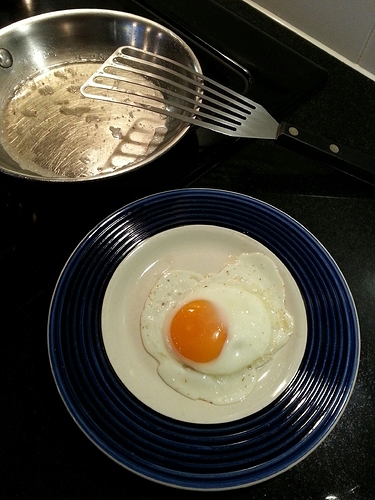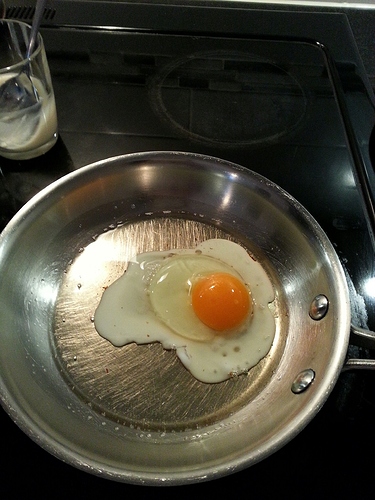Plz put this where it belongs in the forum if not here 
So I’m curious… I’m in WI & it’s freezing here. Free Range organic eggs… I’m guessing they are fed a corn meal of sorts seeing as it’s winter… CORN is bad for us… How bad are eggs for us in winter months & if they are as bad as I think… Would it matter if eggs are bought in a store rather than a farm? Hope this made sense
Free range vs regular old store eggs
I grew up with fresh eggs out on a country property away from the city. When we switched to store bought, I wondered where all the flavor had gone. The yolks were pale and bland and never double. We had double yolks all the time from our chickens.
Now, mind you, we kept a variety of species of chickens in a large outdoor pen with a home-built custom chicken house we locked them in away from predators every night. There was always at least one rooster so the hens could feel “safe.” We fed them kitchen scraps, weeds we picked from the garden, cracked corn, and store bought feed. I played with them often and fed them bugs and worms I caught. I can still speak chicken to this day.
This all probably had a fuckload to do with the quality of those eggs.
The term free range has different meanings, depending on jurisdiction and local poultry standards. Typically, free range means there’s a door the chickens can access for certain number of hours in a day. Whether or not they choose to exit doesn’t matter. The colour of yolks gives away what the chickens are eating. Light yellow means grain feed, and darker orange means they are scratching and pecking the ground outdoors.
Chickens can be fed a variety of grain meal, containing corn and soy. Some farmers buy organic scraps from butchers, food manufacturers, fishing operations, etc. but, it’s usually indicated on the carton if they don’t with “chicken are fed a vegetarian feed” or “no animal by products”.
But, I don’t think there is cause for panic here. I believe eating those eggs during winter months are still pretty nutritious. Certainly not as nutritious as when chickens can be outdoors, but given that this us seasonal, I wouldn’t be too concerned.
Getting to know a farmer and buying eggs directly from them is always better. But, don’t feel bad if you cannot find a farmer, or don’t have a way to drive out to the country, or whatever. Do things as necessary within reason. Step one is eating eggs…they are great nutrition. If you can access farm eggs, then great, do that too.
Free range means the chickens are not in individual (or group) cages. It doesn’t mean much. Pastured means the chickens get out of the coop & get to peck & scratch for whatever they find to eat. Most people supplement this with a commercial feed, even in summer. When there’s lots of grass seeds, bugs, worms etc, the chickens will munch a bit of feed, then go off to find whatever they can dig up. In winter, they choose to eat more feed.
Definitely eggs from pastured hens are more tasty. More importantly, the chickens are happier & healthier, which leads to healthier eggs. Less stress is better for them, better for us. Better for eggs!
But that’s not to say grocery store eggs are no good -not true!
Find a local chicken person & see if they can spare some eggs. Warning: It may spoil you for the grocery store stuff.
I have had both… And I must admit, I love the taste of the farm eggs in the summer/fall. So my big question is, can the corn feed come thru to us and cause us information and an increase in cholesterol # due to the feed being corn?
Here’s an example of a chicken egg where chicken spends lots of time outdoors. Yolk is dark orange.
Another thing to look for is how firm the egg is when raw. The yolk and white around them should be quite firm and stand up high in the pan. Industrial eggs are “floppier” and they sit lower in the pan
@Jan, actually “free run” means that they are not in cages, but allowed to roam spread out on the floor in a barn. “Free range” means they are free run with access to outdoors, through a door. “Pastured” means they are housed in such a way that they are by force standing on soil (pasture) where they can scratch and peck bugs/grass/worms, as opposed to free range where there is a tiny door they can access to go outside, but don’t have to.
Umm, ignoring your cholesterol question and just answering your egg composition question.
Yes, what the chicken eats is what makes up the egg. Chickens eating soy meal have soy protein eggs. Same goes with omegas.
This. ^^^
It’s great to get eggs from a farm/farmer you trust, if cost and availability make that feasible. But eating the right stuff, even if it’s not from your local farm, is still better than eating grains, sugar, etc. instead. The only caution I would offer for store-bought eggs (even “free range”) is to be cautious about contamination. If you use them for making mayo, for example, you may want to consider pasteurizing them beforehand, if that is a concern for you.
Anything that is pretty much in the same form that it left the farm (Any farm) without any chemical processing is likely going to be a damn site healthier for you than anything you open out of a cardboard box with a laundry list of ingredients, half of which you can’t pronounce.
my friend at work has “backyard chickens” and brought me some eggs… :happydance:
wish my yard was big enough for chickens and that my dogs wouldn’t harass them lol
Dawn. I also live in Wisconsin and have been wondering the same thing. Even a farmed egg has to have corn/soy feed to get through the winter. Should we even bother with this source of protein? Will the fact that they are eating corn and or soy impact our systems? By April the girls will be out on grass again. For now, should we should switch to an alternate great source of Vit A and D, namely grassfed liver which I eat anyway a couple times/wk. By the way, do you know of any ketogenic groups in the Madison area?
I can’t get my kids to eat eggs from a farmer friend of mine. They find the favour to be overpowering and off-putting. They’re too used to the bland and pale store bought eggs.
@kate I don’t know of any in madison… you must be local!! Exciting to see someone close to me. I kinda think eggs in winter, unless I stock up, should be avoided…
I dont know anything about the internal chemistry of chickens & their egg producing magic or to what degree their diet alters the nutritional value of the eggs we eat. It would be fascinating to know what if any differences there are between eggs from corn & soy eating chooks compared to grass & worm eaters. I don’t want to eat corn, soy, grass or worms so will just continue to buy any/all eggs from chickens that are raised & treated humanely, not caged.
My egg producers live in a yard a block from me. I’m a 10 minute walk from a large downtown metro area. God bless America.


